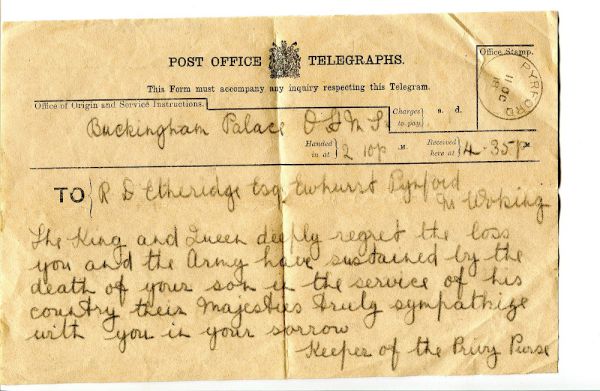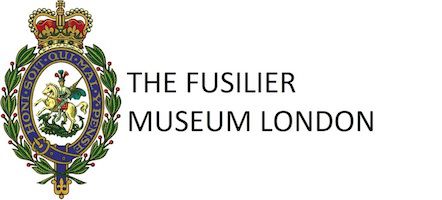Little is known about Hugh Dimsdale Etheridge’s early life. Baptismal records show that he was born on 2nd May 1887 and baptised on 3rd July that same year. He was a pupil at King’s College School in Wimbledon from 1899 to 1904 and in 1910 began a farming venture with his Uncle at Bishopstone, which his father financed.
On the 3rd September 1914, Etheridge enlisted in the 12th Battalion Royal Fusiliers at Westminster. He trained for just over a year in Epsom and Mansfield, Notts. In a series of postcards sent to his family, Etheridge details just how taxing the training was;
We have had such a long week that I have been too tired to write. We went out for three days from Monday, came home Wednesday night. Started again Thursday morning and came home yesterday, so hope to sleep all this afternoon.
His battalion was despatched to France in November 1915, where Etheridge served as a runner- the most dangerous of private soldier tasks- on the Western Front for over two years. Like many servicemen, he suffered a few injuries and illnesses along the way. Quite soon after despatch Etheridge injured his right knee and although he tried to continue serving, it was found necessary to send him back to England, where he underwent an operation and subsequently returned to fight in July 1916. He was present at the Battle of the Ancre (13th-18th November 1916), soon after which he was invalided home due to pneumonia in December.
Etheridge returned to the Front in May 1917 and was present at the Battle of Messines (7th-14th June) and was awarded the Military Medal for bravery in the field;
At 7:30pm on the night of 14th June, 1917 in the operation north of Railway Battlewood, this man displayed great bravery and coolness under heavy machine gun fire, in bringing back messages from the Outpost like to Headquarters. It was greatly owing to his determination, that information was kept up between forward post and company commander during the operations.
Etheridge was notified of his award on 24th June, and he wrote home to his mother the next day to relay the good news, along with the wish to be given ‘a few days leave as well so that I could see you all again.’ Less than six weeks later, Etheridge was awarded a Bar to the Military Medal for his devotion to duty on 31st July- the first day of the Third Battle of Ypres (The Battle of Passchendaele):
This man showed the greatest devotion to duty. He carried important messages under intense machine gun and shell fire from the front line and thus enabled valuable information to be sent back to Brigade Headquarters.
In September 1917, Etheridge writes home to his family, expressing his interest in trying for a commission. He was successful and carried out his training at Magdalen College, Oxford between January and June 1918. After passing he was appointed to 2nd Lieutenant and returned to France in July 1918.
He was later commissioned into the 17th Battalion Royal Fusiliers, joining them for the final offensive across the Canal du Nord. Though he was awarded numerous times for his gallantry and bravery, Etheridge still wished to be a part of the action, so as to not be ‘put down as a dud’, as such he was glad to have joined a Battalion in action ‘so that I can get a good name’. His last letters to family express his regret at being appointed ‘A’ Company Second in Command, as he had gotten to know then men in the platoon in ‘D’ Company very well. His thoughtfulness for the men under his command was apparent when he wrote to his mother on 24th September, asking her to send him several cap badges to give to his soldiers who had lost theirs.
 Sadly, just six weeks before the
Armistice, Etheridge died from a severe wound on his left thigh in the early
hours of 2nd October 1918, sustained from an attack on the 28th
September. He had been taken to the Casualty Clearing Station in Grevillers,
and was operated on at once, but ‘got weaker and weaker, and fell asleep quite
peacefully’. He died before learning that he had won the Military Cross for
‘Conspicuous gallantry on the attack of September the 2nd.’ In 1923
Etheridge posthumously received both the 1914-15 Star and Victory Medal for his
services during the war.
Sadly, just six weeks before the
Armistice, Etheridge died from a severe wound on his left thigh in the early
hours of 2nd October 1918, sustained from an attack on the 28th
September. He had been taken to the Casualty Clearing Station in Grevillers,
and was operated on at once, but ‘got weaker and weaker, and fell asleep quite
peacefully’. He died before learning that he had won the Military Cross for
‘Conspicuous gallantry on the attack of September the 2nd.’ In 1923
Etheridge posthumously received both the 1914-15 Star and Victory Medal for his
services during the war.
